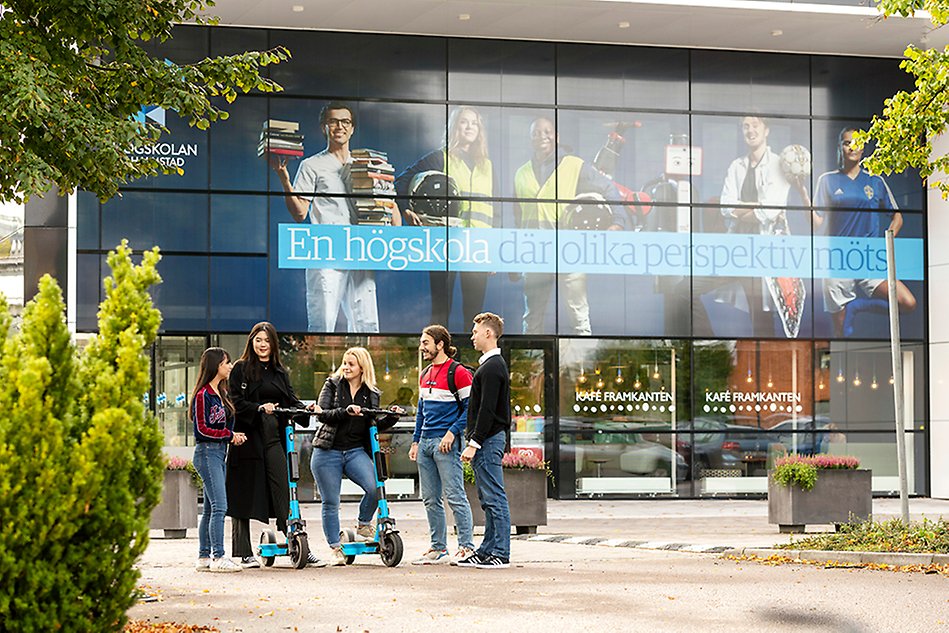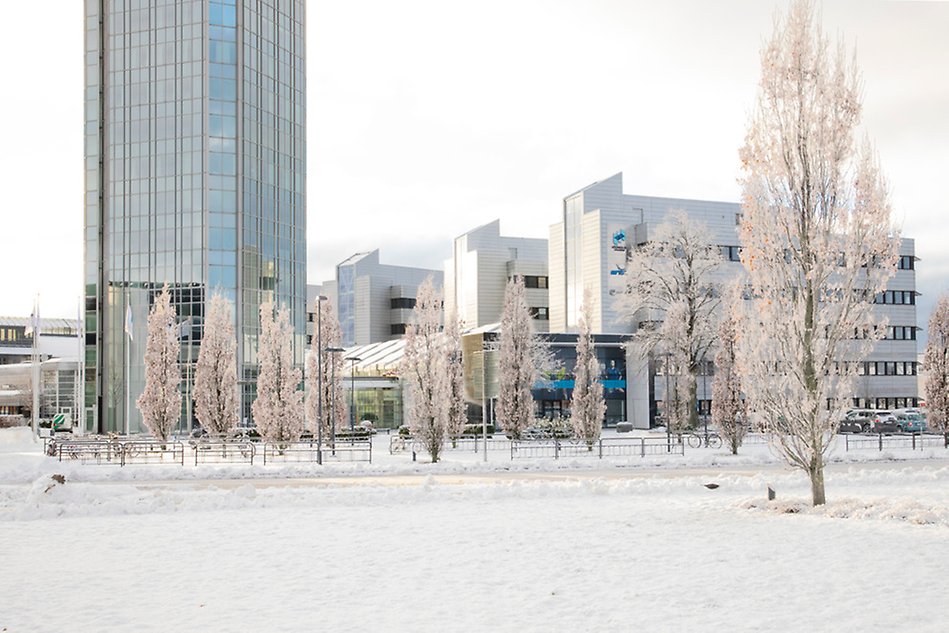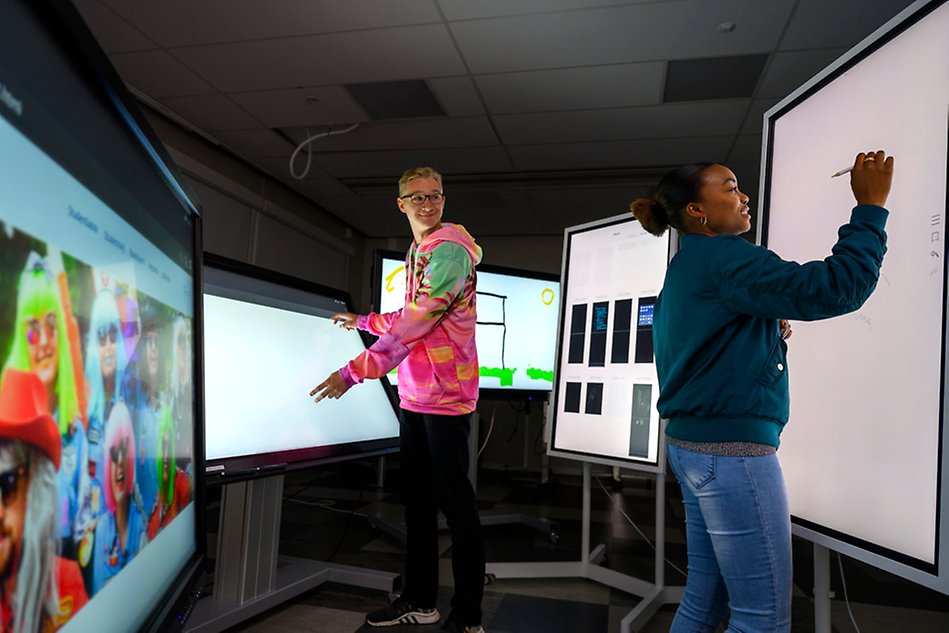Marie-Skłodowska Curie Postdoctoral Fellowship at Halmstad University
Halmstad University welcomes researchers who are interested in joining us as a Marie Curie Postdoctoral Fellow!
The Marie-Skłodowska Curie Postdoctoral Fellowship (MSCA-PF) is a post-doctoral research and training programme in which the post-doc (fellow) gains additional skills and abilities working on a specific research project in a new environment, while also transferring their knowledge within their new institution. Open to all fields of research, the fellowship is a well-defined, 2-year-career stage.
In addition to carrying out the research project, the fellow will participate in training and career development activities, which are an integral part of the programme, and he/she can include secondments at other research facilities, companies, or public sector organisations.
The proposal writing process is a joint undertaking by the applicant and the supervisor/the host organisation. If your MSCA-PF project with Halmstad University is granted, you are expected to move to Sweden and work at the premises of our University.
If you intend to apply for the postdoctoral fellowship programme and if you have identified either a research group that you want to become part of or an individual researcher you would like to apply with, please get in contact with Meike Froitzheim to ensure that you take advantage of the support services offered at the University to help you prepare a successful proposal.
Contact: meike.froitzheim@hh.se

Who can apply?
Formal requirements
At the call deadline (10 September 2025), supported fellows:
- must be postdoctoral researchers, i.e., in a possession of a doctoral degree, defined as a successfully defended doctoral thesis, even if the doctoral degree has yet to be awarded, and
- must have a maximum of 8 years full-time equivalent experience in research, measured from the date of award of the doctoral degree. Years of experience outside research and career breaks (e.g., due to parental leave) can be deducted. If you are a citizen or long-term resident in an EU or associated country, then time spent outside Europe can also be deducted. However, all extensions need to be documented and will be checked by the European Commission.
Mobility
- Researchers interested in PFs should comply with mobility rules: they must not have resided or carried out their main activity (work, studies, etc.) in the country of the beneficiary (for European Postdoctoral Fellowships), or the host organisation for the outgoing phase (for Global Postdoctoral Fellowships) for more than 12 months in the 36 months immediately before the call deadline.
Nationality
Supported researchers can be of any nationality. However, researchers going to a third country (Global Postdoctoral Fellowship) or researchers who wish to reintegrate to Europe, must be nationals or long-term residents of EU Member States or Horizon Europe Associated Countries.
Calculate your eligibility through the Enspire Science MSCA-PF Eligibility calculator External link.
These formal requirements are strictly applied by the EU Commission. Please get in contact with Meike Froitzheim or the research support team at Halmstad University if you have questions about your eligibility.
Your profile
In addition to the formal eligibility requirements, it is also important that you meet several/most of the following requirements:
You should:
- have a good publication track record
- have presented at well-established seminars, conferences in your research field
- have been involved in the organisation of workshops/seminars/conferences
- have been a member of a review panel or editorial board
- hold academic/professional membership
- have won prizes or other awards for research and/or other related achievements
- have experience in leadership, teaching and/or supervision
- have been involved in public engagement knowledge transfer activities
- hold mobility/international experience

Why apply for a MSCA-PF at Halmstad University?
Halmstad University is a university where different perspectives meet! Our vision is to add value, drive innovation and prepare people and society for the future.
Since the beginning in 1983, innovation and collaboration with society have characterised the University's education and research. The research is profiled, of high quality, internationally reputable and mainly conducted in a multidisciplinary manner within the University's two focus areas: Health Innovation and Smart Cities and Communities. The University has a wide range of education with many popular study programmes and it is well-known for its vibrant campus culture.

Advantages of applying for a MSCA-PF at Halmstad University
- Halmstad University offers modern, innovative, and well-equipped environments for education, research, and collaboration.
- In 2020, we were granted the HR Excellence in Research Award (HRS4R).
- During proposal preparation, the research support group support you by offering guidance documents, personalised feedback, and in-depth proposal checks.
- The University offers:
- flexible working hours (based on core hours).
- Swedish language training for staff.
- Wellness allowance: wellness related activities are reimbursed up to maximum SEK 1500 per calendar year.
- In 2019/2020, Halmstad was elected as the Swedish student city of the year.
- Halmstad and the province of Halland offers you an idyllic mixture of sandy beaches and lush forests, a rich foodie culture and a wealth of outdoor activities.

Where will you work?
The following research environments at Halmstad University are interested in your expression of interest to join Halmstad University as a MSCA-PF:
School of Education, Humanities and Social Sciences
The School of Education, Humanities and Social Sciences (LHS) has two departments with around 90 employees. The School educates teachers, linguists, cultural theorists and social scientists, conducts research and collaboration, and works to develop regional, national and international collaborations within learning, the humanities and society.
Research is conducted within educational science, humanities and social sciences, and proposals should fit broadly within the disciplines of educational sciences, political science, public administration, criminology, cultural studies, and history. Research proposals that incorporate aspects related to digitalisation and local/regional governance are especially welcome.
More information about the School of Education, Humanities and Social Sciences
Research at the School of Education, Humanities and Social Sciences
The School of Education, Humanities and Social Sciences develops sustainable models for collaboration with the surrounding society, for example through prominent elements of work-based research within the three research areas digitisation, learning and social change. The areas are also linked to the global goals of Agenda 2030, which focus on sustainability, equality and justice.
Learning in the digital society, responsibility and democracy, European border policy, storytelling, names and identity are examples of themes within the research. The research is practice-oriented and is often conducted in collaboration with other actors in society. The School’s research asks critical questions, challenges established ways of thinking, is driven by curiosity and has the potential to contribute to innovative solutions to society’s challenges.
Collaboration and innovative environments
The School works to develop regional, national and international collaborations within learning, the humanities and society. Collaborations with preschools, schools and education is organised by the Collaboration for learning and development (SamLär). Teacher training internships and other course-related internships provide an additional vital arena. The School is home to the Digital Laboratory Centre (DLC), a creative, high-tech laboratory environment with a focus on teaching, culture, communication and creativity.
For exchange possibilities, the School of Education, Humanities and Social Sciences has agreements with over 70 partner institutions all over the world.
School of Information Technology
The School of Information Technology (ITE) offers education on all levels, from undergraduate to PhD education, as well as education for professionals. Research is conducted within aware intelligent systems, smart electronic systems, cyber physical systems and digital service innovation. The School is a multicultural school with around 155 employees from 20 different countries.
Research at the School of Information Technology
The School of Information Technology is the most research-intensive part of Halmstad University. The School is a “complete academic environment”, which means that research, education, and collaboration with external partners are closely linked. The School is organised into two departments: The Department of Intelligent Systems and Digital Design (ISDD) and the Department for Computing and Electronics for Real-time and Embedded Systems (CERES). The research is organised into four technology areas: Aware Intelligent Systems, Digital Service Innovation, Systems of Cyber Physical Systems, and Smart Electronic Systems. The first two are core areas within the ISDD department, the latter two are core areas within the CERES department.
It is the ISDD department that will be the host of the proposed project, and has currently 85 staff members, wherein approximately 59 are active in the AI area. The focus of AI has been lately focused on two main application areas: healthcare and mobility, aka information-driven care (IDC) and predictive maintenance. Information Driven Care is now a research programme funded by Halmstad University and hosts several research projects within this area of research.
More information about the School of Information Technology
Current calls for expression of interest
Expression of interest: Biometrics Recognition
Would you be interested in spending 1–2 years as a postdoc on a research project of your choice in a small but ambitious research environment in southwest Sweden? The School of Information Technology at Halmstad University invites one candidate of any nationality to develop a collaborative MSCA Postdoctoral Fellowship application within the European Commission’s Horizon Europe program.
With international reputation and relevant contributions, Halmstad University is one of the pioneers of biometric research in Sweden, and the most active group in the field. The two seniors, Professor Josef Bigun and Dr. Fernando Alonso Fernandez, have jointly +40 years of experience in the field. Much of our research in this area is collaborative, due to substantial funding attracted across the years from Swedish financiers (VR, Vinnova, KKS), EU, industry, and government agencies. Our rich network worldwide is also result of joint publications, guest visits, conference organisation, committees, invited keynotes, editorial appointments and boards, panels, awards, and distinctions. A (non-exhaustive) list of research topics where we have been active recently include:
- fingerprints (latent fingerprints, quality analysis, minutiae detection, feature extraction)
- iris (segmentation, feature extraction)
- periocular (eye detection, feature extraction, cross-spectral recognition)
- face (detection, tracking, feature extraction)
- lip-motion for liveness and identity (detection, tracking, feature extraction)
- soft-biometrics
- super-resolution reconstruction
- multi-biometrics
More information about this call can be found on the European Union’s website.
Expressions of Interest for Biometrics Recognition External link.
Contact
-
The research support team at Halmstad University

